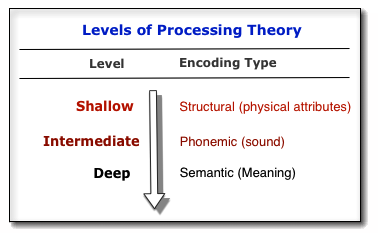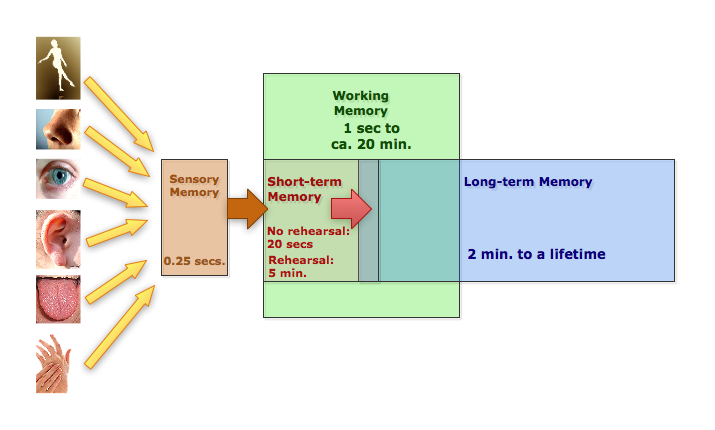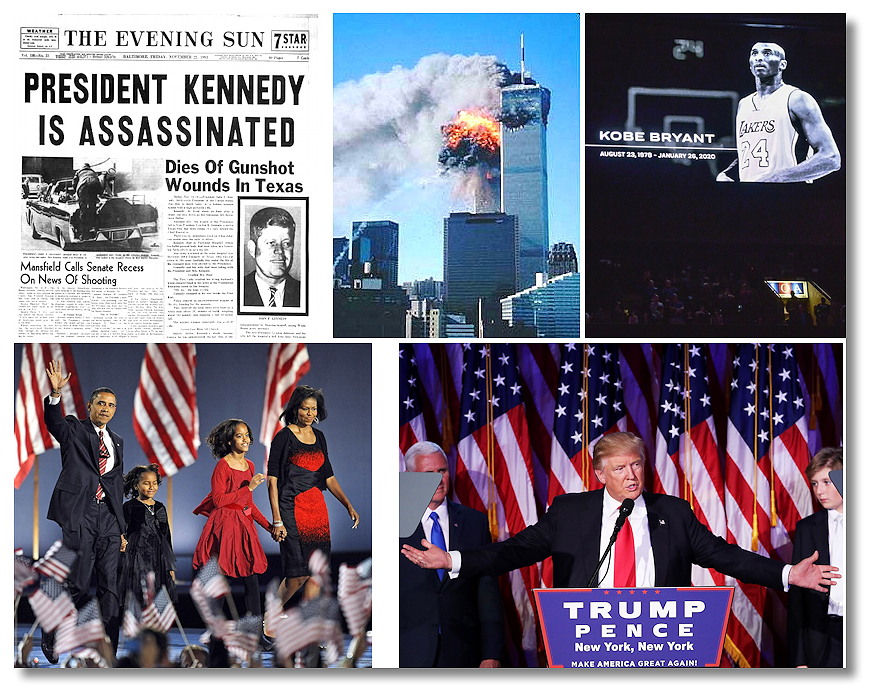| PSY
101
Updated September 10, 2025
|
||

In the 2002 movie, The Bourne Identity, Matt Damon's character, Jason Bourne, finds himself with a host of remarkable abilities to defend himself but doesn't know who he is or why he is being chased by US government agents.
What would it be like for you to wake up some morning here at Le Moyne College with the kind of memory loss of Jason Bourne, that is, you can do various things but you haven't the slightest clue who or where you are? What would that be like?
If any one of these kinds of memory no longer works right, you will be a very different kind of person
Three Processes or
Activities involved in Memory
 Levels of
Processing Theory (see diagram on right)
Levels of
Processing Theory (see diagram on right)Example of Levels of Processing Theory adapted from Wikipedia
In a set of experimental studies (Craik & Tulving, 1975) student participants were given a list of 60 words. Each word was presented for 6 seconds on a screen. Participants were asked to pay attention and respond to 1 of 3 kinds of questions about each word. Each kind of question is associated with a particular level of processing:
- One category of questions (shallow) were about how the word were presented visually (Word: "Is the word shown in CAPITAL LETTERS?").
- The second category of questions (intermediate) were about the phonemic qualities of the word ("Does the word rhyme with the word "bee"?).
- The third category of questions (deep) were presented so that the reader was forced to think about what the word means or what category the word falls in [semantic] ("Can you meet one in the street [a friend]"?)
Example words and questions used
Word
Format
"is the word capitalized?"
Rhyme
"does it rhyme with...?"
Question
"Is it...?"
Speaking
SPEAKING
leaking
a way to communicate
Gun
gun
fun
a type of weapon
Grass
GRASS
class
a type of plant
Witch
witch
pitch
something associated with magic
After the participants had seen all 60 words, they were asked to look through a list of 180 words (60 they had already seen and 120 they had not seen). For each of the 180 words they were asked, "Did you see this word before on the screen?" Here are the results of how well they remembered seeing the words according to the kind of questions they were asked:
The correct recall of whether the participants had seen the words before was directly related to the level of processing when they first saw (and encoded) the word.
This finding has implications for how a student should study. For example, rather than trying to remember only what a phrase or a word looks like, you ought to ask yourself "what does this mean?" and try to come up with something in your own words.

![[Atkinson & Shifrin Model]](../psy101graphics/atkinson_shifrin_model.jpg)
A. Sensory Memory = Information is maintained in its sensory form (visual, auditory, etc.) for a very brief period of time (ca. 0.25 secs.)
B. Short-term Memory (STM) = a limited capacity story that can maintain unrehearsed information for up to about 20 seconds
- Rehearsal = the process of repeatedly thinking about or verbalizing the information to one's self.
- Without rehearsal, most information decays in less than 20 seconds.
- Capacity of Storage
- George A Miller's "Magic Number 7 +/- 2" (1956). We can keep in STM on average 7 (plus/minus 2) pieces of information at a time.
- More recent work suggests that the capacity of STM is probably smaller than Miller suggested (4 plus/minus 1).
- Chunking of information: grouping familiar or similar stimuli as a single unit
![[Baddeley's Working Memory]](../psy101graphics/baddeley_workingmemory.jpg) Allan
Baddeley's "Working Memory" (2001) Model (see diagram)
Allan
Baddeley's "Working Memory" (2001) Model (see diagram)Working memory = a modular system for the temporary storage and manipulation of information
Four components
- Phonological rehearsal loop
- Visuo-spatial sketch pad
- Episodic buffer (temporarily pulling in information from Long Term Memory)
- Executive Control System
Working memory capacity (WMC) = the ability to hold & manipulate information in conscious attention
- Stable personal trait
- Can be reduced by situational factors like stress or worry.

- Kennedy Assassination (1963), Humans Landing on the Moon (1969), Space Shuttle Challenger Disaster (1986), Oklahoma City Bombing (1995), Death of Princess Diana (1997), Columbine HS Massacre (1999), September 11 Attacks (2001)
- Election of Obama (2008), Election of Trump (2016), Death of Kobe Bryant (2020), Death of George Floyd (2020)
- Research has shown that these memories are neither as accurate nor complete as people either think or early theorists believed.
- Vividness ≠ accuracy
1. Using Cues to Aid Retrieval
2. Reinstating the Context of an Event
- Tip of the Tongue phenomenon = a temporary inability to recall information that you know you know and that you feel is just out of reach
- You can help jar your memory by using retrieval cues, that is, stimuli that prompt the recall.
3. Relying on Schemas
- Considering the context in which you learned something can serve as a powerful retrieval cue
- On crime procedural shows like Criminal Minds, the use of forensic hypnosis usually shows the hypnotist asking the relaxed subject to think about the setting, what they might have been feeling or smelling or hearing. These cues (not really the hypnosis) sometimes trigger recollections of what was forgotten.
Schema = an organized cluster of knowledge about a particular event or object abstracted from previous individual instances or experiences.
- What are the schemas for college professor? high school jock? lawyer? clergy? Army soldier?
Consider what you might think an NFL professional football player looks like. Suppose you saw a 10-second video clip of a player being interviewed in a locker room. What would you tend to remember?
- We tend to remember facts consistent rather than inconsistent with our schemas
- You might remember that he was wearing his uniform or carrying his helmet, but would probably not remember that he was holding a copy of a newspaper in his hand.
- HOWEVER, we tend to remember facts that are clash significantly with our schemas
- If that football player was holding a bouquet of roses in his hand or putting on a fur coat, we'd probably remember that fact.
4. Reconstructing Memories
- KEY NOTION: Contemporary psychology shows that memories are NOT like a videotape machine playing back something that was previously recorded. Our brains are not stamped with exact copies of our experiences.
- Rather, recalled memories are reconstructions of what we have experienced in the past at varying levels of accuracy. We rebuild again each time we remember something.
- Misinformation Effect = a participants recall of events is altered by misleading information introduced after the event
- First described by psychologists Elizabeth Loftus
- Witnesses estimate of the speed of two cars in a filmed accident varied significantly whether they were asked (1) how fast the cars were traveling when they hit each other or (2) how fast the cars were traveling when they smashed together?
- Also, because of schema effects, when asked if there was glass present, witnesses often believed that there was glass on the ground when no glass was present.
- The very telling of a story again and again often begins to introduce inaccuracies in the memory's reconstruction.
- Eyewitness testimony is probably the weakest type of evidence.
YouTube Video explaining her work (begin at 1.48 until 6:50): from Psychology Unlocked (https://www.youtube.com/watch?v=-tbwrUYqytQ)
Loftus has recorded a 17-minute TedTalk about her work and you can watch it is you want at https://www.youtube.com/watch?v=PB2OegI6wvI
5. Source Monitoring
- Mistakes in memory retrieval are often due to source-monitoring errors, i.e., a memory which is attributed to one source but actually derived from another source. Human memory fails to label the sources of our information. Indeed, sometime the problem is that the memory is one of a dream as the source and one fails to recall that fact.
- For example, you may have read some story about a celebrity or a politician and failed to notice that the story came from a suspect source such as the National Enquirer or some other gossip publication. (FYI, since you cannot defame a dead person in American law, be especially cautious about stories about dead celebrities or politicians, e.g., both Sen. Robert Kennedy & Mrs. Jacqueline Kennedy Onassis had affairs with the ballet dancer Rudolph Nureyev).
- Look over some of the suspect stories on a site like the Tampa Bay Times' Politifact.com ("Pants on Fire" Lie list). Particularly in the last 10 years, there have been all sorts of made-up or phony stories and, even, "deepfake" images or movies posted online. For example, using Photoshop a fake photo of Obama shaking hands with the President of Iran was circulated by various anti-Obama politicians (here Rep. Paul Gosar, AZ). The actual photo from 2011 was Obama meeting the Prime Minister of India to discuss nuclear arms control. Note, too, that the arrival of Artificial Intelligence has created a far more likely spread of such false information. Another excellent source to check if something online is true is Snopes.com (https://www.snopes.com) [NOT Snopes2.com]